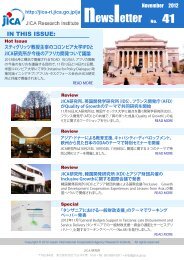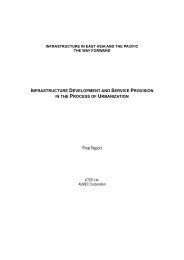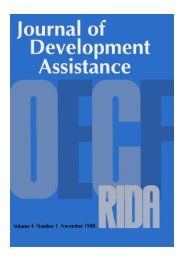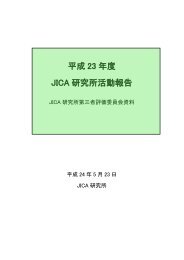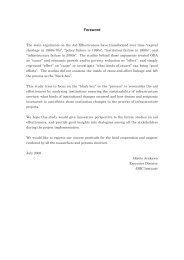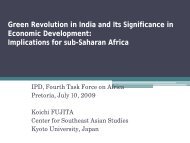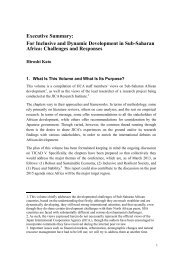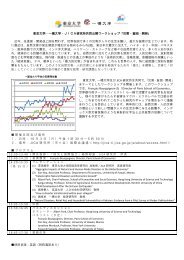Japan Cooperation - JICA Research Institute
Japan Cooperation - JICA Research Institute
Japan Cooperation - JICA Research Institute
Create successful ePaper yourself
Turn your PDF publications into a flip-book with our unique Google optimized e-Paper software.
http://jica-ri.jica.go.jp<br />
newsletter<br />
March 2012<br />
No. 33<br />
IN THIS ISSUE:<br />
Hot Issue<br />
Joint Conference on Security<br />
and Development Explores<br />
Further Potentials of Euro-<br />
<strong>Japan</strong> <strong>Cooperation</strong><br />
<strong>JICA</strong>-RI cohosted a conference titled “Addressing<br />
Local Conflicts before They Turn Global” with the Konrad<br />
Adenauer Stiftung (KAS) and the European <strong>Japan</strong><br />
Advanced <strong>Research</strong> Network (EJARN) in Tokyo on<br />
February 21.<br />
READ MORE<br />
Review<br />
<strong>JICA</strong>-RI Conducts <strong>Research</strong> for an Upcoming Book<br />
on the Cerrado in Brazil<br />
Akio Hosono, director of <strong>JICA</strong>-RI, and Yutaka Hongo, visiting senior<br />
advisor, traveled to Brazil from February 4 to 19 to conduct a second field<br />
survey for their forthcoming book The Agricultural Development Miracle.<br />
READ MORE<br />
Review<br />
<strong>JICA</strong>-RI Convened Symposium on "East Asian<br />
Economic Recovery"<br />
<strong>JICA</strong>-RI organized an open symposium "The Second East Asian<br />
Miracle : Political Economy of Asian Responses to the 1997/98 and<br />
2008/09 Crises" in Tokyo on February 27. READ MORE<br />
Review<br />
<strong>JICA</strong> and KOICA’s Joint Workshop: An Opportunity of<br />
Mutual Learning for Delivering Impact in Development<br />
<strong>Cooperation</strong><br />
<strong>JICA</strong> and KOICA held an all-day workshop titled “Mutual Learning for<br />
Effective Development <strong>Cooperation</strong> after Busan” in Seoul on February 16,<br />
and over 100 people turned out to join the event.<br />
READ MORE<br />
Copyright © 2012 <strong>Japan</strong> International <strong>Cooperation</strong> Agency <strong>Research</strong> <strong>Institute</strong><br />
All rights reserved<br />
<strong>JICA</strong> <strong>Research</strong> <strong>Institute</strong><br />
10-5 Honmura-cho, Ichigaya, Shinjuku-ku, Tokyo, 162-8433 <strong>Japan</strong> • Tel: 81-3-3269-2911 • dritpl@jica.go.jp
Joint Conference on Security and<br />
Development Explores Further Potentials of<br />
Euro-<strong>Japan</strong> <strong>Cooperation</strong><br />
Review<br />
<strong>JICA</strong>-RI cohosted a conference titled “Addressing<br />
Local Conflicts before They Turn Global” with the<br />
Konrad Adenauer Stiftung (KAS) and the European<br />
<strong>Japan</strong> Advanced <strong>Research</strong> Network (EJARN) in Tokyo<br />
on February 21. KAS is a German political foundation<br />
and a think-tank that conducts studies and education<br />
programs globally, while EJARN, a group of European<br />
scholars on <strong>Japan</strong>, engages in policy research on<br />
<strong>Japan</strong>ese politics, economy,<br />
and security as well as<br />
Euro-<strong>Japan</strong>ese relations.<br />
<strong>Research</strong> Fellow<br />
Mari Katayanagi<br />
The conference was part of<br />
a KAS-EJARN joint project<br />
that examines obstacles and<br />
potentials for cooperation<br />
between Europe and <strong>Japan</strong><br />
in areas such as post-conflict<br />
reconstruction, stabilization<br />
and development of conflictaffected<br />
countries.<br />
At the event, which about 150 researchers,<br />
practioners, diplomats and students attended,<br />
experts from Europe and <strong>Japan</strong> shared their research<br />
outcomes and explored the possibilities of collaboration<br />
on peace-building and human security issues between<br />
the two.<br />
<strong>JICA</strong>-RI Director Akio Hosono opened the<br />
conference with welcome remarks, and <strong>JICA</strong> President<br />
Sadako Ogata and H.E. Hans Dietmar Schweisgut,<br />
Ambassador of the European Union to <strong>Japan</strong>, each<br />
gave an opening speech.<br />
Subsequently, the conference was divided into<br />
four parts: Linkage between Micro Security and<br />
Development and Global Stability (Session 1);<br />
Experiences in Asia (Session 2); Experiences in Africa<br />
(Session 3); and Panel Discussion.<br />
In the second session, Jun Honna, <strong>JICA</strong>-RI visiting<br />
fellow and Ritsumeikan University professor, made<br />
a presentation titled “Maritime Crimes in Southeast<br />
Asia: Human Securitizing the Policy Paradigm.” He<br />
is the leader of a project “Mainstreaming Human<br />
Security in ASEAN Integration” at <strong>JICA</strong>-RI. He told the<br />
audiences there is a variety of maritime crimes besides<br />
piracy and recommended effective counter measures<br />
including non-militaristic regional cooperation between<br />
each enforcement agency at sea and tackling poverty<br />
problems in coastal areas.<br />
<strong>Research</strong> Fellow Mari Katayanagi introduced the<br />
findings from the study “Prevention of Violent Conflict in<br />
Africa” in Session 3. After briefly explaining the project<br />
and the concept of Horizontal Inequalities (HIs), which<br />
the team applies to analyze, she described the structural<br />
problems of African societies and the measures taken<br />
to address the issues in some countries. To prevent<br />
recurrence of a conflict that can cause cross boarder<br />
damages, it is important for development actors to<br />
plan their activities with a possibility of a gap of local<br />
people’s perceptions in account, and to assist the<br />
recipient country’s government in development through<br />
sensitive planning, Katayanagi stressed.<br />
In the final session,<br />
panelists reviewed major<br />
discussion points and<br />
proposed ways of furthering<br />
an EU-<strong>Japan</strong> contribution<br />
to global security, stability<br />
and development. <strong>Research</strong><br />
Associate Ryutaro Murotani,<br />
as a discussant, emphasized<br />
the significance of a<br />
comprehensive approach<br />
<strong>Research</strong> Associate<br />
Ryutaro Murotani<br />
to address diverse security<br />
agendas from non-traditional (such as human security)<br />
to traditional security (military security, for example).<br />
He noted that, given the difference in their preferences<br />
on aid modalities, it is necessary to identify where EU-<br />
<strong>Japan</strong> cooperation effort can maximize its effect, either<br />
on the ground level or policy level.<br />
According to Murotani, the conference turned out<br />
to be an opportunity to exchange information and<br />
views from both Europe and <strong>Japan</strong>. He also said, “The<br />
discussion reminded us of the width of the security<br />
agendas and the importance of operationalizing<br />
the concept of human security in the <strong>Japan</strong>ese<br />
development assistance.”<br />
2<br />
<strong>JICA</strong> <strong>Research</strong> <strong>Institute</strong> Newsletter No.33 • March 2012
Review<br />
<strong>JICA</strong>-RI Conducts <strong>Research</strong> for an Upcoming<br />
Book on the Cerrado in Brazil<br />
Akio Hosono, director of <strong>JICA</strong>-RI, and Yutaka<br />
Hongo, visiting senior advisor, traveled to Brazil<br />
from February 4 to 19 to conduct a second field<br />
survey for their forthcoming book The Agricultural<br />
Development Miracle. This is the fifth volume of the<br />
Project History series which analyzes the success<br />
factors of the past <strong>JICA</strong> projects, and describes the<br />
transformation of the Cerrado into the world’s top<br />
granary.<br />
The sites the team visited this time include the<br />
capital Brasilia and the regions in the Tocantins<br />
and Mato Grosso states where the PRODECER<br />
(<strong>Japan</strong>-Brazil Agricultural Development <strong>Cooperation</strong><br />
Program) had been carried out.<br />
Here are some facts Hosono and Hongo could<br />
confirm through the field surveys:<br />
1) Prudent environmental consideration<br />
P R O D E C E R h a s l o n g b e e n e n g a g e d i n<br />
agricultural development in the Cerrado with<br />
consideration for environment, about 15 years<br />
ahead of the 1992 Rio “Earth Summit.” This fact<br />
was confirmed through interviews with many of the<br />
people involved including Carlos Magno, former<br />
director of the Aglicultural <strong>Research</strong> Center for the<br />
Cerrado(CPAC) and former director-president of<br />
the Brazilian Agricultural <strong>Research</strong> Corporation<br />
(EMBRAPA). In addition, PRODECER was carried<br />
out with an even greater emphasis on environmental<br />
protection after the Earth Summit, which the team<br />
reconfirmed with information provided by Dr. Edson<br />
Eyji Sano of the Brazilian <strong>Institute</strong> of Environment<br />
and Renewable Natural Resources (IBAMA).<br />
The city of Lucas do Rio Verde, located in the<br />
Cerrado region, presents an example of successful<br />
environmental preservation endeavor. The most<br />
outstanding achievements of the city include, among<br />
others, the promotion of Cadastro Ambiental Rural<br />
(CAR), a farmland registration program created with<br />
GPS data as part of their social environment project.<br />
With these efforts the city was commended by<br />
Jornal do Brasil, one of Brazil’s major newspapers,<br />
as the most accomplished environment-friendly city<br />
of the country in 2006.<br />
2) Promoted regional value chain<br />
The team also confirmed PRODECER contributed<br />
to diversification of agriculture in the region as well<br />
as the creation of vast value-chains in and around<br />
the Cerrado through the development of agrolivestock-industry-related<br />
manufacturing sector. And<br />
these changes initially started with the construction<br />
of colonies (settlements) by farmers, who ventured<br />
into the region as members of cooperative unions.<br />
These developments have resulted in the increased<br />
employment opportunities and improved incomes in<br />
the region.<br />
Consequently, those cities that served as centers<br />
of PRODECER are now placed at the top of the<br />
country’s Human Development Index ranking (UNDP<br />
measures that show the quality and degree of<br />
development of peoples’ life).<br />
For example, Lucas do Rio Verde is ranked 8th<br />
out of more than 5,000 municipalities in Brazil, and<br />
top within the state of Mato Grosso. Director Hosono<br />
said, “The mayor, city officials, and farm producers<br />
all agreed that PRODECER was the starting-point<br />
Lucas do Rio Verde, Mato Grosso<br />
state and its suburban soy field<br />
f o r t h e s u c c e s s<br />
of Lucas do Rio<br />
Verde.”<br />
I n To c a n t i n s ,<br />
the state governor<br />
s t r e s s e d t h a t<br />
PRODECER has<br />
been invaluable<br />
for the agricultural<br />
development of the<br />
state.<br />
3<br />
<strong>JICA</strong> <strong>Research</strong> <strong>Institute</strong> Newsletter No.33 • March 2012
Review<br />
<strong>JICA</strong>-RI Convened Symposium on “East<br />
Asian Economic Recovery”<br />
<strong>JICA</strong>-RI organized an open symposium "The<br />
Second East Asian Miracle : Political Economy of<br />
Asian Responses to the 1997/98 and 2008/09 Crises"<br />
in Ichigaya, Tokyo on February 27. Some 80 people<br />
were in attendance at the event.<br />
East Asia achieved economic growth which has<br />
been dubbed “the East Asian Miracle.” Despite the<br />
Asian currency crisis in 1997-98, the region made<br />
a V-shaped recovery, and also overcame the 2008-<br />
09 global financial crisis. <strong>JICA</strong>-RI's research project,<br />
which the title of the symposium was named after,<br />
aims to analyze the mechanism of the economic<br />
recovery from the most recent crisis – possibly<br />
referred to as the "Second East Asian Miracle" --<br />
from a political-economy perspective. Nine experts<br />
involved in the project shared their analyses.<br />
Three <strong>JICA</strong>-RI researchers – senior research<br />
advisor Keiichi Tsunekawa (professor at the National<br />
Graduate <strong>Institute</strong> for Policy Studies), research<br />
fellows Yasunobu Okabe and Jean-Claude Maswana<br />
– gave presentations, titled respectively: "<strong>Japan</strong>:<br />
Political Economy of Long Stagnation;" "Financial<br />
Restructuring after the 1997 Crisis and Impact of<br />
the Lehman Shock: Path Dependence of Financial<br />
System in Korea and Thailand;" and "Reflections on<br />
the Role of the Banking Sector in China and Korea’s<br />
Export-led Growth."<br />
In his presentation, Tsunekawa, who believes that<br />
the lack of policy coherence in <strong>Japan</strong> has become<br />
an impediment to its economic recovery, showed a<br />
concern that economic development in democratizing<br />
Asia’s middle-income countries might stagnate due<br />
to incoherent industrial and welfare policies.<br />
Okabe analyzed different approaches Korea and<br />
Thailand took for financial restructuring through<br />
examining the historical path of the financial system<br />
in each country. In Korea, restructuring of the financial<br />
sector progressed comparatively fast after the 1997<br />
crisis, but the country suffered again from the 2008-09<br />
financial crisis. Meanwhile, Thailand, where financial<br />
restructuring process moved at a slower pace, was<br />
able to avert the latter crisis.<br />
Maswana compared China and Korea and reported<br />
that while the banking sectors in both countries<br />
contributed to export-driven economic growth, their<br />
functions began to differ after the 1997-98 crisis,<br />
reflecting their ties with the state and foreign capitals.<br />
Below is the list of presentations made by<br />
researchers outside of <strong>JICA</strong>-RI.<br />
・”Global Finance and Two Asian Crises”, T.J. Pempel<br />
(University of California, Berkeley, USA)<br />
・”The Politics of Economic Upgrading in Export-<br />
Oriented Southeast Asia”, Richard Doner (Emory<br />
University, USA)<br />
・”Between Economic and Political Crises: Thailand’s<br />
Contested Free Trade Agreements”, Thitinan<br />
Pongsudhirak (Chulalongkorn University, Thailand)<br />
・”99 Problems (But A Crisis Ain’t One): Political<br />
Business and External Vulnerability in Island Southeast<br />
Asia”, Thomas Pepinsky (Cornell University, USA)<br />
・”Unraveling the Enigma of East Asian Economic<br />
Resiliency: The Case of Taiwan”, Yun-han Chu<br />
(Academia Sinica, Taiwan)<br />
・”Roads to Privatization: Strategic Privatization in<br />
the Korean Public Sectors”, Whasun Jho (Yonsei<br />
University, South Korea)<br />
Some of their research outcomes will be published<br />
as <strong>JICA</strong>-RI Working Papers in late March.<br />
4<br />
<strong>JICA</strong> <strong>Research</strong> <strong>Institute</strong> Newsletter No.33 • March 2012
Review<br />
<strong>JICA</strong> and KOICA’s Joint Workshop: An<br />
Opportunity of Mutual Learning for Delivering<br />
Impact in Development <strong>Cooperation</strong><br />
<strong>JICA</strong> and its Korean<br />
counterpart Korea<br />
International <strong>Cooperation</strong><br />
Agency (KOICA) have<br />
been closely collaborating<br />
in various ways. In<br />
furthering this partnership,<br />
two agencies held an<br />
all-day workshop titled<br />
Deputy Director “Mutual Learning for<br />
Hiroshi Kato<br />
Effective Development<br />
<strong>Cooperation</strong> after Busan”<br />
in Seoul on February 16,<br />
and over 100 people, including practitioners<br />
involved in ODA work, academics and college<br />
students turned out to join the event. KOICA’s<br />
Vice President Sungmog Hong, Director of<br />
ODA <strong>Research</strong> Office You-ah Chung and other<br />
officials were among those who attended. From<br />
<strong>Japan</strong>, <strong>JICA</strong>-RI’s Deputy Director Hiroshi Kato,<br />
Senior Advisor to Deputy Director Koji Yamada<br />
and <strong>Research</strong> Associate Shunichiro Honda as<br />
well as <strong>JICA</strong>’s Daiki Kunitake (deputy director of<br />
Development Partnership Division) participated.<br />
Out of diverse topics, the workshop focused<br />
on three agendas: research and practice<br />
linkage, public-private partnership (PPP), and<br />
programme based approaches (PBAs, for<br />
Senior Advisor to<br />
Deputy Director Koji<br />
Yamada<br />
short, is a concept that stands on the principle<br />
of coordinated support for recipient-country-led<br />
national development programs among donors<br />
and other actors), and speakers from <strong>JICA</strong> and<br />
KOICA each made a presentation on these<br />
issues.<br />
In the closing speech, Deputy Director Kato said<br />
that the workshop had become a fruitful occasion<br />
for both to share each other’s experience<br />
(especially thanks to the hard work of KOICA<br />
research office staff), and expressed his wish<br />
to continue the mutual learning opportunities,<br />
hopefully for jointly disseminating the knowledge<br />
of the two agencies globally in the future.<br />
[More on this workshop here.]<br />
<strong>Research</strong> Associate<br />
Shunichiro Honda<br />
5<br />
<strong>JICA</strong> <strong>Research</strong> <strong>Institute</strong> Newsletter No.33 • March 2012


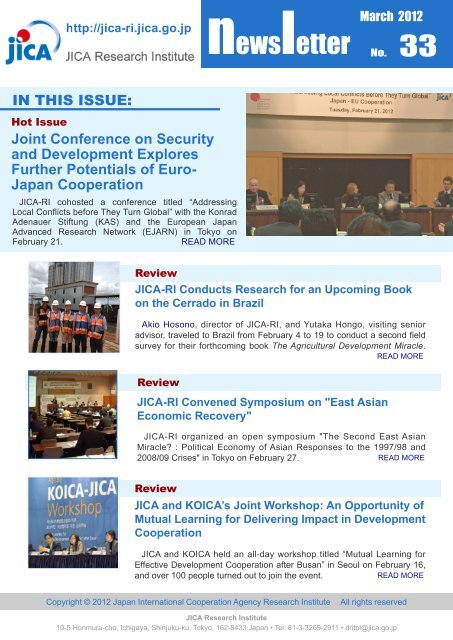
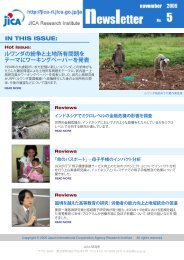
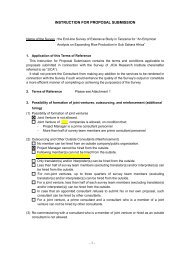

![新たな時代の開発 [寄稿]我が国製造業の競争パフォーマンス 欧州に ...](https://img.yumpu.com/45564809/1/185x260/-.jpg?quality=85)
